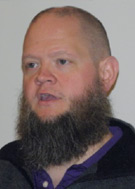Club News & Articles
Our News Items

Guest Column - The Holy Land
March 1, 2020
As a recent ordained in the UMC, my Bishop invited me to accompany him and over forty other pilgrims on this incredible journey. As a Christian pastor and a lifelong disciple, the spiritual component of the pilgrimage was awe-inspiring. To walk in that place, to feel the boat rocking under my feet as the Sea of Galilee whipped into one of its famous wind-storms, to touch an olive tree so ancient it may very well have been one that Christ laid his back against as he took his ease in the garden, or, on that final night, prayed for relief from God… all of these things were, in a word, overwhelming. In another word, powerful.
In yet another word, only part of the story.
For me, the Holy Land is rich with theological significance, with ancient stories, some factual, some allegorical, but all part of the building blocks of faith. But the pilgrimage would have been incomplete if we didn't visit the sites of scripture to see them in their historical context as well. If we didn't embrace the idea that there is, and should be, a certain amount of skepticism surrounding not only the events depicted in scriptural writings, but the cultural background and social infrastructure that led to those events.
Context is always important. Without context, we can never understand our stories, let alone the stories of another place, and another time.
Our trip took place just a week or two after the current administration unveiled its peace plan for the Palestinian and Israeli people. There was a certain amount of trepidation in continuing forward with the trip, given that our agenda was roughly evenly split between areas within the region under Palestinian and Israeli control and indeed tensions were very high, on both sides of the wall.
Context is important, and I wanted to understand the context, not politically, but in its effect on people. For me, when I seek cultural context, I'm usually going to find it in a bar. Sure enough, several of the evenings we were in the Holy Land found me in hole-in-the-wall bars, in the Palestinian city of Bethlehem, in the Israeli city of Tiberias on the shores of the Sea of Galilee, and in the blended, and very tense, city of Jerusalem. These nights out made the next mornings… well, harder to get started, for sure.
But they also reminded me of a fundamental truth of the human condition: people are, in fact, people. We all want to live, and love, and experience joy, and fulfillment. We don't mind hard work, but we yearn for the certainty that all our hard work will result in security, if not comfort.
And each one of us has a story to share. One that might not always be what we expect to hear.
Because we all live in context. And context matters.
Author: Steve Dale
Sally Sugarman (Club Member & Windmill Editor)
Guest Column - The Holy Land
March 1, 2020
As a recent ordained in the UMC, my Bishop invited me to accompany him and over forty other pilgrims on this incredible journey. As a Christian pastor and a lifelong disciple, the spiritual component of the pilgrimage was awe-inspiring. To walk in that place, to feel the boat rocking under my feet as the Sea of Galilee whipped into one of its famous wind-storms, to touch an olive tree so ancient it may very well have been one that Christ laid his back against as he took his ease in the garden, or, on that final night, prayed for relief from God… all of these things were, in a word, overwhelming. In another word, powerful.
In yet another word, only part of the story.
For me, the Holy Land is rich with theological significance, with ancient stories, some factual, some allegorical, but all part of the building blocks of faith. But the pilgrimage would have been incomplete if we didn't visit the sites of scripture to see them in their historical context as well. If we didn't embrace the idea that there is, and should be, a certain amount of skepticism surrounding not only the events depicted in scriptural writings, but the cultural background and social infrastructure that led to those events.
Context is always important. Without context, we can never understand our stories, let alone the stories of another place, and another time.
Our trip took place just a week or two after the current administration unveiled its peace plan for the Palestinian and Israeli people. There was a certain amount of trepidation in continuing forward with the trip, given that our agenda was roughly evenly split between areas within the region under Palestinian and Israeli control and indeed tensions were very high, on both sides of the wall.
Context is important, and I wanted to understand the context, not politically, but in its effect on people. For me, when I seek cultural context, I'm usually going to find it in a bar. Sure enough, several of the evenings we were in the Holy Land found me in hole-in-the-wall bars, in the Palestinian city of Bethlehem, in the Israeli city of Tiberias on the shores of the Sea of Galilee, and in the blended, and very tense, city of Jerusalem. These nights out made the next mornings… well, harder to get started, for sure.
But they also reminded me of a fundamental truth of the human condition: people are, in fact, people. We all want to live, and love, and experience joy, and fulfillment. We don't mind hard work, but we yearn for the certainty that all our hard work will result in security, if not comfort.
And each one of us has a story to share. One that might not always be what we expect to hear.
Because we all live in context. And context matters.
Author: Steve Dale
Sally Sugarman (Club Member & Windmill Editor)


